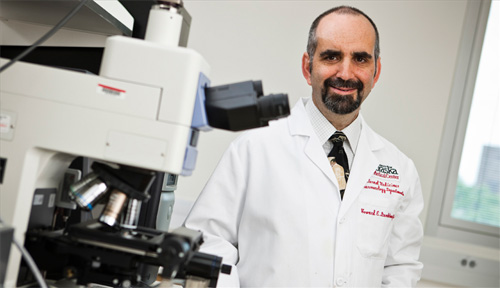A UNMC research team has been awarded a five-year, $8.8 million grant from the National Institute on Drugs of Abuse-National Institutes of Health for their work on HIV/AIDS treatment and eradication. The goal of the research is to develop a long-acting antiretroviral therapy that could be taken once every six months to provide chemical viral eradication. The work, if realized, could represent a major breakthrough for HIV/AIDS patients, who currently have to take one pill each day.
A team effort
Dr. Gendelman's research team has exceeded $20 million in active funding largely focused on nanomedicines. Since 2010, the combined research efforts of the research team have led to 10 other grants totaling more than $12 million.
The research brings together a highly integrative, cross-disciplinary team of scientists, including researchers at the Scripps Research Institute. The UNMC team members include:
College of Pharmacy
Tatiana Bronich, Ph.D.
Yazen Alnouti, Ph.D.
College of Medicine – Department of Radiology
Michael Boska, Ph.D.
College of Medicine – Department of Pharmacology and Experimental Neuroscience
Larisa Poluektova, M.D., Ph.D.
Santhi Gorantla, Ph.D.
Shilpa Buch, Ph.D.
Benson Edagwa, Ph.D.
Prasanta Dash, Ph.D.
Mariluz Anamelva Arainga Ramirez, Ph.D., D.V.M.
Howard Fox, M.D., Ph.D.
R. Lee Mosley, Ph.D.
JoEllyn McMillan, Ph.D.
Robin Taylor
"Pill fatigue, co-morbid diseases, substance abuse and drug toxicities can affect drug compliance," said Howard Gendelman, M.D., the principal investigator on the grant.
Dr. Gendelman is professor and chair of the UNMC Department of Pharmacology and Experimental Neuroscience. Antiretroviral therapy (ART) has revolutionized HIV treatment, he said. Drugs are combined that attack the virus at different stages of its reproductive cycle. ART doesn't cure HIV, but it stops it from spreading.
The goal of ART is to get the viral load in the blood stream so low that tests can't even detect it. HIV is still there, but there's not enough of it to cause symptoms – as long as patients keep taking their medications.
"Dr. Gendelman continues to drive the science to improve ART therapy," said Jennifer Larsen, M.D., vice chancellor for research. "This most recent grant is a testament to both his previous work and his vision of where the science should be going. I share his excitement that the research holds great promise for creating better therapies for patients."
Working with two major pharmaceutical companies, the UNMC scientists have packaged antiretrovirals into targeted nanoparticles, which can improve drug biodistribution and target sites where the virus hides. A prime directive for the work is to bring the drug to sites where the virus hides and to combine ART with other medicines that work to destroy whatever virus remains in the body.
"It's a sort of seek and destroy mission for the research," said Dr. Gendelman, who noted that preliminary test results in animal models have been promising. He said the long-term goal of the research is to enable a new product. Under development is a nanomedicine good manufacturing facility, on the UNMC campus, which would develop formulations for phase I clinical testing.
"Because of the success of Dr. Gendelman's research team, we have established a nanomedicine pre-production plant and by next spring will have a GMP nanoproduction facility operational," said Deb Thomas, interim vice chancellor for business and finance. "Knowing this team as I do, it's just the start where the best is yet to come."

I am proud to work in the PEN department at UNMC. I'm in awe of the pure genius of those who work every day to change the world. Congratulations to the research team and Dr. Gendelman.
Howie,
KUDOS on your research grant!!
Carol Russell
None
Dr. Ram